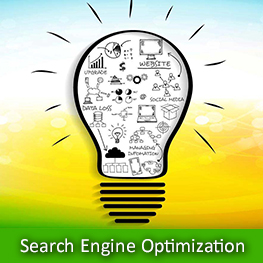Search Engine Optimization (SEO)
Search Engine Optimization (SEO)
Course Brief
Search Engine Optimization is the process of increasing the visibility of a website in a search result. Naturally, in a search result, the websites appearing at the top of the list are preferred by the users. In SEO we adopt certain methods by which the search engine ranks our website at the top in contrast to millions of others websites about the same topic. Therefor increasing the traffic to a page and advertising cost. An SEO analyst reviews and implements changes to website so they are optimized for the search engines and are ranked better in search results.
Curriculum
Video Presentation
FAQs
Introduction to Search Engine Optimization (SEO)
In this module we'll begin our interesting journey to explore modern Search Engine Optimization (SEO). We'll start by learning how search engine works. We'll also explore Google's search mechanism, followed by a quick introduction of Google AdWords. Understanding content impact on SEO. Then we'll look at some other Search Engine and try to find similarities and differences between their way of doing things as compare to the Google.
Content and SEO
In this module we'll learn about content and its impact on SEO. We'll also have a look on how we can develop content for SEO purpose either by curation, creation or collaboration. Then we move on to creating a Google account to get benefited from Google’s remarkable tools for SEO. Then we’ll learn how to create a blog which is excellent tool for creating content for SEO. Then we’ll learn to setup a free Google website and learn how to use it in our SEO drill. Moving on we’ll discuss videos and their impact on SEO, we’ll also discuss how to make videos for SEO purposes. We’ll also have a short demo of video editing on YouTube. At the end we’ll discuss images in SEO context and learn how to manipulate images to make them SEO friendly.
SEO Rules – Basics
What is modern SEO and Classic SEO. Why content matters? What is on-page and off-page SEO? How to plan SEO for new website? Simple formula for SEO i.e. See, here, and there Rule. Understanding key meta tags and their uses.
Keyword Research Theory and Tools
Every good SEO Plan start with keyword research hence we’ll devote a whole module to this subject. How keyword research can be utilized in both SEM (Search Engine Marketing) and SEO. We’ll try to understand what are keyword opportunities. We’ll also differentiate between search volume and competition and explore some methods for keyword research. We’ll learn to use AdWords Keywords Planner and try some real-world keyword research case studies.
Real-life Examples
In this module we’ll put our SEO knowledge to use and try to enhance SEO of blog and a website.
Measuring and Analyzing SEO Performance
Quality can not be assured without measuring results. In this module we’ll learn how we can measure and analyze our SEO performance. How to find and duplicate content. Then we’ll introduce Google Analytics and learn how to use it to measure impact of your SEO. We’ll study how to track conversion in SEO. We’ll setup our Google Analytics Account and link it to Blog and website. Then we’ll see some examples of reports generated from Google Analytics.
Indexing, Webmaster Tools and Search Console
In this short but important module we’ll learn about indexing and particularly Google Webmaster and Search Console tools which are related to indexing. We’ll learn how to checking indexing with Google. We’ll explore Google Webmaster Tools and Search Console. Then we’ll learn how to connect Webmasters tools and Search Console. At the end we’ll learn how to check SEO ranking from Search Console.
Keeping up with Latest SEO Developments and Trends
At last we’ll sum up with review of everything learned so far, and look at some key resources to keep exploring the exciting world of SEO. We also do a mockup prepare for job interview and create resume highlighting the skill acquired in this course.
Course Brief
Search Engine Optimization is the process of increasing the visibility of a website in a search result. Naturally, in a search result, the websites appearing at the top of the list are preferred by the users. In SEO we adopt certain methods by which the search engine ranks our website at the top in contrast to millions of others websites about the same topic. Therefor increasing the traffic to a page and advertising cost. An SEO analyst reviews and implements changes to website so they are optimized for the search engines and are ranked better in search results.
Curriculum
Video Presentation
FAQs
Introduction to Search Engine Optimization (SEO)
In this module we'll begin our interesting journey to explore modern Search Engine Optimization (SEO). We'll start by learning how search engine works. We'll also explore Google's search mechanism, followed by a quick introduction of Google AdWords. Understanding content impact on SEO. Then we'll look at some other Search Engine and try to find similarities and differences between their way of doing things as compare to the Google.
Content and SEO
In this module we'll learn about content and its impact on SEO. We'll also have a look on how we can develop content for SEO purpose either by curation, creation or collaboration. Then we move on to creating a Google account to get benefited from Google’s remarkable tools for SEO. Then we’ll learn how to create a blog which is excellent tool for creating content for SEO. Then we’ll learn to setup a free Google website and learn how to use it in our SEO drill. Moving on we’ll discuss videos and their impact on SEO, we’ll also discuss how to make videos for SEO purposes. We’ll also have a short demo of video editing on YouTube. At the end we’ll discuss images in SEO context and learn how to manipulate images to make them SEO friendly.
SEO Rules – Basics
What is modern SEO and Classic SEO. Why content matters? What is on-page and off-page SEO? How to plan SEO for new website? Simple formula for SEO i.e. See, here, and there Rule. Understanding key meta tags and their uses.
Keyword Research Theory and Tools
Every good SEO Plan start with keyword research hence we’ll devote a whole module to this subject. How keyword research can be utilized in both SEM (Search Engine Marketing) and SEO. We’ll try to understand what are keyword opportunities. We’ll also differentiate between search volume and competition and explore some methods for keyword research. We’ll learn to use AdWords Keywords Planner and try some real-world keyword research case studies.
Real-life Examples
In this module we’ll put our SEO knowledge to use and try to enhance SEO of blog and a website.
Measuring and Analyzing SEO Performance
Quality can not be assured without measuring results. In this module we’ll learn how we can measure and analyze our SEO performance. How to find and duplicate content. Then we’ll introduce Google Analytics and learn how to use it to measure impact of your SEO. We’ll study how to track conversion in SEO. We’ll setup our Google Analytics Account and link it to Blog and website. Then we’ll see some examples of reports generated from Google Analytics.
Indexing, Webmaster Tools and Search Console
In this short but important module we’ll learn about indexing and particularly Google Webmaster and Search Console tools which are related to indexing. We’ll learn how to checking indexing with Google. We’ll explore Google Webmaster Tools and Search Console. Then we’ll learn how to connect Webmasters tools and Search Console. At the end we’ll learn how to check SEO ranking from Search Console.
Keeping up with Latest SEO Developments and Trends
At last we’ll sum up with review of everything learned so far, and look at some key resources to keep exploring the exciting world of SEO. We also do a mockup prepare for job interview and create resume highlighting the skill acquired in this course.



Comments
Post a Comment